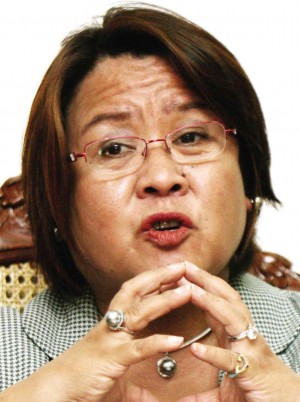No more prosecutors’ allowances from LGUs
CEBU CITY—All prosecutors and their staff will be prohibited from receiving allowances and other emoluments from local government units (LGUs) across the country, Justice Secretary Leila de Lima announced on Sunday.
“One of the ways to ensure integrity of our prosecutors is to ensure that they do not get entangled with politicians,” De Lima told over 2,000 lawyers at the end of the 15th Integrated Bar of the Philippines’ (IBP) National Convention held here.
She said she would issue a directive prohibiting all prosecutors and employees of prosecution services nationwide from receiving allowances and other forms of benefits from LGUs “to ensure that they do not feel beholden to local politicians who might affect their independence and partiality in the discharge of their mandate.”
The directive will be “for strict compliance,” she said.
Regional State Prosecutor Fernando Gubalane, who earlier admitted receiving at least P34,000 from four LGUs in Cebu, declined to comment on De Lima’s announcement. “Let me just reserve my comment once I receive her written directive,” he said.
Article continues after this advertisementIn 2011, a businesswoman and another prosecutor accused Gubalane of receiving “excessive” stipends from various LGUs in Central Visayas where he serves as chief prosecutor.
Article continues after this advertisementGubalane has explained that allowances received by prosecutors from LGUs are “legal” and allowed under the Local Government Code of the Philippines, city ordinances, and Republic Act No. 10071, or the Prosecution Service Act of 2010.
He cited Article 3, Section 458(1) of the Local Government Code, which states that the local council may provide, “when the finances of the city government will allow, for additional allowances and other benefits to judges, prosecutors, public elementary and high school teachers, and other national government officials stationed in or assigned in the city.”
RA 10071 also states that prosecutors shall receive allowances from their respective government units in amounts not exceeding 50 percent of their basic salaries.
Acting Cebu City Prosecutor Ma. Luisa Ratilla was not happy with De Lima’s directive. “That is a sad news. [Filing a motion for] reconsideration is an option,” she said in a text message to the Inquirer.
Prosecutors in the city currently receive an allowance of P10,000 each from the Cebu City government every month. In the past years, they had been getting P18,000, but the amount was reduced due to budget constraints.
Each of the provincial prosecutors receives P10,000 from the Capitol.
A prosecutor has a basic salary ranging from P25,000 to over P60,000, depending on his or her rank or length of service, and receives “special” allowances from the Department of Justice (DOJ), ranging from P15,000 to P20,000.
Aside from prosecutors, associate justices of the Court of Appeals’ (CA) Cebu Station, trial court judges, clerks of court, agents of the National Bureau of Investigation, and the Public Attorney’s Office also receive allowances from LGUs.
Only Executive Justice Gabriel Ingles of the CA Cebu Station has declined to receive any stipend, saying he wants to maintain independence “in reality and public perception.”
In her speech during the opening of the IBP convention on Friday, Chief Justice Ma. Lourdes Sereno also expressed concern about the grant of stipends by LGUs to judges and justices. “We could not be vulnerable to LGUs,” she said.
Each Municipal Trial Court in Cities (MTCC) judge is presently receiving a monthly stipend of P30,000 from the Cebu City government, while each Regional Trial Court (RTC) judge in Cebu City receives P35,000 from the city government and P12,000 from the Capitol.
De Lima said her department was doing its best to ward off politicians while carrying out its mandate.
She said she also issued a memorandum “not to consider” endorsement from politicians in considering applicants for appointments and promotions for the National Prosecution Service.
“Let us begin to build a reputation of integrity, probity and independence. The rule of law could not be dependent on personalities, connections, wealth, or influence,” De Lima said.
To discourage prosecutors and other employees from engaging in illegal activities, she said, the DOJ would impose disciplinary sanctions on its erring members.
“There are still those who selfishly tarnish the institution in favor of their own interests. Some of them learned the hard way even though I know it would expose the department’s dirty laundry to the public,” she said.
“I have no qualms about ordering entrapment operations against a few of our own. If I need to do entrapments every week, I will do so,” she added.
The DOJ currently lacks manpower, De Lima said, pointing out 662 vacancies for the position of prosecutors nationwide.
“Much as we want these positions filled as soon as possible, we do not wish to forsake quality for the sake of haste,” she said.
